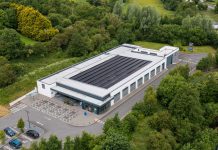Schneider Electric has announced that it is teaming up with Avnet and Iceotope to jointly develop innovative, chassis-level immersive liquid cooling solutions for data centres. This newly announced partnership brings together three global technology innovation leaders: Avnet for technology integration services; Iceotope for chassis-level immersion cooling technologies; and Schneider Electric for data centre infrastructure solutions.
“Compute intensive applications like AI and IoT are driving the need for better chip performance. Our quantitative analysis and testing of liquid cooling approaches shows significant benefits to the market,” said Kevin Brown, CTO and SVP of Innovation, Secure Power, Schneider Electric. “This partnership is the next step in solution development and we are excited to be working with Avnet and Iceotope.”
Schneider Electric’s preliminary analysis of a chassis-level immersion cooled solution versus a traditional air-cooled solution shows CapEx savings of 15 percent and energy savings of at least 10 percent, which leads to a 20-year Total Cost of Ownership (TCO) savings of over 11 percent.
“Largely driven by the recent explosion of IoT, the processing power needed for workloads like AI in data centres requires advanced solutions to keep connected systems operating efficiently,” said Scott MacDonald, global president, Avnet Integrated. “The development of a liquid cooling technology solution offers customers the performance needed to deliver on these growing compute demands. This is a prime example of how we work with customers to provide the advanced solutions necessary to meet the needs of data-centric workloads in virtually every industry.”
“Iceotope is delighted to work with Schneider and Avnet on a solution that delivers on the promise of liquid cooling,” said David Craig, CEO of Iceotope. “Working with great partners that share the same passion for innovation, solution focused thinking and quality is a pleasure. Our ability to bring our IP to combined solutions that manage the pressing challenges of chip density, energy and water consumption, space and location challenges and the ever more complex issues relating to harsh environment and climate will be game changing in the industry.”
The parallel-processing power of Graphical Processing Units, known as GPUs, makes them the most efficient processor for a growing number of applications including AI, big data analytics, data mining, and more. The chips are increasingly power dense with thermal design power ratings reaching 400 watts or more. This makes traditional data centre air-cooled architectures impractical, or costly and less efficient than liquid-cooled approaches where the server is partially submerged in a dielectric fluid. According to Schneider, liquid cooling offers the following benefits:
- Efficient: No need for air conditioning, delivers same processing power with less energy
- Silent: No industrial drone from fans and pumps
- Resilient: All components are in a sealed module that resists dust and smoke
- Compact: Smaller, more flexible footprint
These benefits mean that liquid cooling could offer advantages for applications other than just extreme power densities. This blog describes five reasons to consider adopting liquid cooling as opposed to traditional air-cooled architectures.



